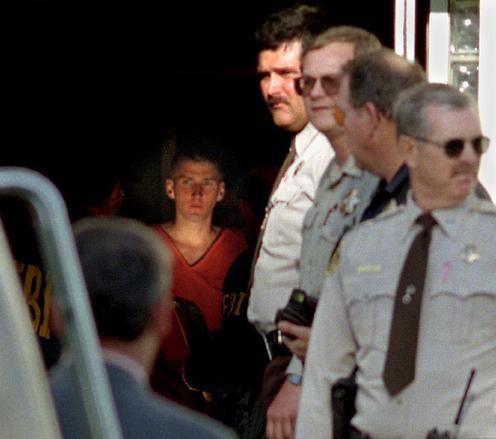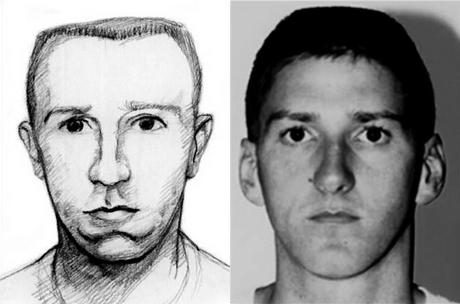.png&w=3840&q=75)
1968 - 2001
Summary
Name:
Timothy James McVeighNickname:
Oklahoma City Bomber / Tim Tuttle / Daryl Bridges / Robert KlingYears Active:
1995Birth:
April 23, 1968Status:
ExecutedClass:
Mass MurdererVictims:
168Method:
BombingDeath:
June 11, 2001Nationality:
USA.png&w=3840&q=75)
1968 - 2001
Summary: Mass Murderer
Name:
Timothy James McVeighNickname:
Oklahoma City Bomber / Tim Tuttle / Daryl Bridges / Robert KlingStatus:
ExecutedVictims:
168Method:
BombingNationality:
USABirth:
April 23, 1968Death:
June 11, 2001Years Active:
1995Date Convicted:
June 2, 1997bio
Timothy James McVeigh was born on April 23, 1968, in Lockport, New York, the only son and middle child of Noreen Mildred “Mickey” Hill and William McVeigh. His family was of Irish-American descent, and he grew up in Pendleton, New York, after his parents divorced when he was ten. Raised by his father, McVeigh developed into a quiet, often withdrawn adolescent, though classmates recalled he could be playful in his youth. His shyness intensified as he grew older, and he had little romantic experience.
McVeigh was intelligent and excelled in computing. In high school, he became fascinated with programming, even hacking into government systems on his Commodore 64 under the handle “The Wanderer.” Although he graduated in 1986 with relatively poor grades, his peers voted him both “Most Promising Computer Programmer” and “Most Talkative” (ironically, because of his reserved nature). He also developed an early fascination with firearms, introduced by his grandfather, and dreamed of opening a gun shop one day.
After high school, McVeigh briefly attended Bryant & Stratton College but dropped out. He worked as an armored car guard and became obsessed with weapons and the Second Amendment. Friends remembered him arriving at work dressed like a paramilitary fighter, wearing bandoliers of ammunition. He became deeply distrustful of the federal government, a sentiment that would only intensify in later years.
In 1988, McVeigh enlisted in the U.S. Army. He proved to be a highly capable soldier, excelling as a gunner on Bradley Fighting Vehicles and receiving several commendations, including a Bronze Star during the Gulf War. Stationed with Terry Nichols and Michael Fortier, both of whom would later play roles in his bombing plans, McVeigh immersed himself in military culture, weaponry, and survivalism.
Discharged honorably in 1991 after failing to complete Special Forces training, McVeigh struggled to reintegrate into civilian life. He took odd jobs, gambled heavily, and became increasingly vocal in anti-government rhetoric. He was especially disturbed by what he saw as federal overreach in the Ruby Ridge standoff of 1992 and the Waco siege in 1993, where 76 Branch Davidians died. These events radicalized him, leading him to believe that the government was waging war against its own citizens.
murder story
The Oklahoma City bombing remains the deadliest act of domestic terrorism in U.S. history. Timothy McVeigh, seeking revenge for Waco and Ruby Ridge, meticulously planned the attack as a strike against the federal government. Working with Terry Nichols, McVeigh constructed a massive truck bomb made from 5,000 pounds of ammonium nitrate and nitromethane, concealed in a rented Ryder truck.
On the morning of April 19, 1995—the second anniversary of the Waco siege—McVeigh parked the truck directly outside the Alfred P. Murrah Federal Building in downtown Oklahoma City. At 9:02 a.m., the bomb detonated, obliterating the north side of the building. The explosion killed 168 people, including 19 children in the daycare center on the second floor, and injured more than 680 others. Over 300 buildings in the surrounding area were damaged.
McVeigh fled the scene but was arrested within 90 minutes during a routine traffic stop for driving without license plates and carrying an illegal firearm. At the time of his arrest, he wore a T-shirt bearing a Thomas Jefferson quote about refreshing the tree of liberty with the blood of patriots and tyrants.

The investigation quickly tied him to the bombing through forensic evidence, including a Ryder truck axle recovered from the blast site, traced back to a rental under the alias “Robert Kling.” Witnesses also placed McVeigh at the Dreamland Motel in Junction City, Kansas, before the attack.

In August 1995, McVeigh was indicted on 11 federal counts, including conspiracy and use of a weapon of mass destruction. His trial, moved to Denver, began in 1997. The prosecution presented overwhelming evidence of his guilt. On June 2, 1997, McVeigh was convicted on all counts, and the jury recommended the death penalty eleven days later. He was formally sentenced to death for the murders of eight federal law enforcement officers killed in the blast. The state of Oklahoma did not pursue additional charges for the other 160 victims, deferring to the federal government.
McVeigh never expressed remorse. In interviews, he coldly dismissed the deaths as collateral damage in his fight against what he believed was tyranny. His letters and writings reflected his radical ideology, often citing The Turner Diaries and likening his bombing to U.S. military strikes abroad. He insisted that his act was politically motivated, not personal.
After exhausting his appeals, McVeigh dropped further legal challenges, effectively expediting his execution. On June 11, 2001, at the age of 33, he was executed by lethal injection at the Federal Correctional Complex in Terre Haute, Indiana. His last meal was two pints of mint chocolate chip ice cream. He declined to speak a final statement but left behind the poem Invictus as his written farewell. McVeigh’s ashes were cremated and privately dispersed.